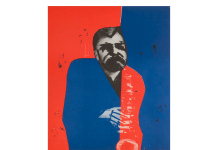Benedick and Beatrice cannot stand the vile thought of getting married, and even if their bachelor lifestyle wasn’t so appealing, their sharp tongues pierce through the skins of potential suitors, scaring away all tenderness. Their recently engaged friends, Hero and Claudio, unilaterally decide that the two wit-driven singletons were destined for one another. Revolving around the story of two sets of lovers, their untimely misfortunes and countless blessings, this production of William Shakespeare’s Much Ado About Nothing occasionally lacks the Bard’s intended tempo, but it nonetheless delivers its iambic punches through the outstanding cast’s brilliance.
As striking as it is provocative, the chemistry between Benedick (Cody Roberts) and Beatrice (April Grace Lowe) borders on fiery passion and spirited seduction. From the beginning, their on-stage romantic attraction is evident from the coy and playful sideways glances, as well as their light-hearted, yet suggestive banter. Roberts and Lowe forge a realistic connection based on their fervent self-denial of mutual affections. Offsetting the more serious acts, the duo’s interactions provide endless chuckles and priceless quotes.
At the forefront of the play is the desire to deceive, which encourages two sets of characters to follow drastically separate paths. While one merry group seeks to create a fortuitous marriage, the other intends to unscrupulously destroy one. Part of the latter team, Todd-Christian Elliot plays the treacherous Don John through whom Elliot succeeds in demonstrating the character’s conniving and malicious nature. With a stage presence similar to that of a charismatic, albeit brutal, dictator, Elliot marches onto the stage and owns it. All eyes are on him, even if he’s not the center of attention.
Best known as a romantic comedy, Much Ado features humorous one-act characters intended for comic relief. As part of that repertoire, John Hope plays Dogberry, the half-witted man responsible for capturing Don John’s henchman. With his mannerisms slightly reminiscent of Benny Hill, Hope delivers the tongue-tying Shakespearian lines without a second thought. Undoubtedly, his monologue “I am an ass” should be exalted for its clever insight into the common man, as well as its near-flawless execution.
Among the most exceptional actors of this production is Ken MacFarlane, who skillfully portrays Leonato, Beatrice’s uncle and Hero’s father. Unlike many of the other characters, Leonato is multi-faceted and as such, needs to fulfill many roles, including that of an enraged father, a buoyant jester and an apt trickster. Lending his previous experience to bring the complex Leonato to fruition, MacFarlane thrives as the widower, showcasing his knack for the elaborate.
Even though the play intermittently loses its dynamism, the Attic Theatre’s Much Ado About Nothing is a competent introduction to Shakespeare’s famous iambic pentameter and renowned writing style. The talented set of actors combined with the Bard’s genius for words makes for an ambitious performance that lacks gusto, but partially compensates for it with ravenous on-stage chemistry and thorough character development.
Much Ado about Nothing is playing at the Attic Theatre through Feb. 25. Tickets cost $20, and the Attic Theatre is located at 5429 West Washington Blvd.
Natalia Evdokimova has been involved with theater throughout her life and has reviewed theatrical productions for local and citywide publications since 2005.













